Topic: Equus Beds aquifer
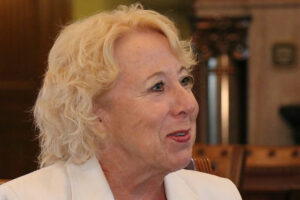
Interview of Christine Downey, August 2, 2019
Interviewed by Dale Goter
Former State Senator Christine Downey recalls her three terms in the Kansas Senate (1993-2004) during her 2019 oral history interview. With her background as a teacher, education issues were important to her as the era of school-funding litigation continued. She was involved in water-related policy making, in particular at the nexus of water quality and agricultural practices. She recalls her service in the Senate and on the Kansas Board of Regents first developing the policy and then implementing fundamental changes to the postsecondary education system. Ms. Downey discusses numerous instances of working across the aisle Show Moreto accomplish policy objectives that did not break on strict party lines. Show Less
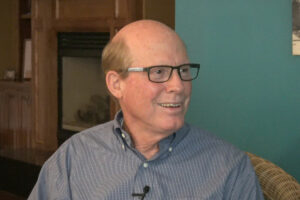
Interview of Ken Grotewiel, December 5, 2019
Interviewed by Rex Buchanan
In this 2019 oral history interview, former Representative Ken Grotewiel recalls learning about the state and its urban/rural divide in addressing water issues. He found that these issues were not generally decided on a partisan basis. While representing Wichita in the Kansas House of Representatives, Grotewiel developed a good working relationship with Carl Dean Holmes, a Republican House member from western Kansas, especially on water issues, when they served together on the House Energy and Natural Resources Committee. Although Grotewiel had a reputation as a liberal environmentalist, he views his approach as that of a pragmatist. Among the Show Morewater issues addressed during his service in the House were purchasing storage in federal reservoirs that involved “minimum desirable stream flows,” irrigation, “water rights” that can affect streams, and the interbasin transfer of water. Grotewiel describes in some detail the challenges of passing legislation to fund the State Water Plan; legislation strongly opposed by farm groups and irrigators. He sites approval of water plan funding as an example of bipartisan cooperation and as the most significant accomplishment during his time in the Legislature. By the time he was appointed by Governor Sebelius to be Assistant Director of the Kansas Water Office in 2002, he noted considerable breakdown of civility in the Legislature. Among issues Grotewiel worked on during his service in the Water Office were use of federal money to purchase water rights along the Arkansas River and the purchase of land to protect the Equus Beds aquifer along with resisting the Legislature's diversion of Water Plan moneys for other purposes. Show Less
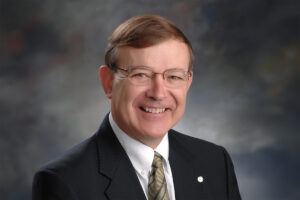
Interview of Dave Heinemann, January 18, 2021
Interviewed by Rex Buchanan
In this early 2021 oral history interview, former State Representative Dave Heinemann recalls the influences that led him to run for office to represent the Garden City area in Finney County, Kansas. He attributes familiarity with farming in southwest Kansas, where water availability is always a challenge, with his understanding of water issues. In this interview, Heinemann talks about the various perspectives from which Kansans evaluate local control of water use. As Chair of the Energy and Natural Resources Committee, Heinemann was able to see how attitudes about public policies regarding the environment frequently cut across party lines. Show More A prior oral history interview of Heinemann can be found in the Statehouse Conversations collection on this site. Show Less
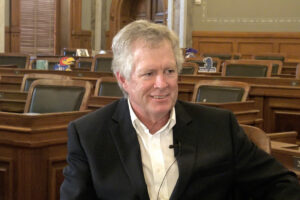
Interview of Dennis McKinney, August 23, 2019
Interviewed by Dale Goter
Dennis McKinney developed many insights in his sixteen years as a leader in the minority party into how the legislature did work, and how it should work. He recounts numerous instances when things worked well because of bipartisan cooperation and compromise. McKinney's experiences on the House Energy and Natural Resources committee working with Carl Holmes and Ken Grotewiel helped shape water policy in Kansas. His experience as a farmer and rancher in south central Kansas coupled with his focus on problem solving led to his reputation as a "middle of the road legislator" who would work Show Morewith both political sides as well as urban and rural. McKinney was committed to public education as well as conservation. The pursuit of fair and balanced tax policy shaped his actions. The interview highlights the importance of leadership from the governor's office and other legislative leaders (Mays, Shallenburger, D. Kerr, Morris). There is an interesting segment about the 2005 Special Session on school finance where McKinney talks about using the courts as leverage. The interview concludes with a brief discussion of the Greensburg tornado. Show Less
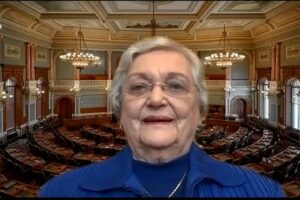
Interview of Ardena Matlack, April 8, 2021
Interviewed by Joan Wagnon
Ardena Matlack describes the Kansas House of Representatives in the 1970’s when so few women were in the Kansas Legislature. Additionally, her second term she experienced being in the majority as a Democrat—something that seldom occurred. While in the majority, she started on the Federal and State Affairs committee as Vice-Chair, and moved up to chair the committee the second year of her term. The committee dealt with the ERA, abortion, liquor and a host of controversial issues. She also served on the Judiciary committee. Her discussion of gerrymandering shows the difficulty in dealing Show Morewith reapportionment that led to her husband losing his Senate seat and encouraging her to run for the House. She also dealt with environmental issues and water issues, particularly in Sedgwick County. Matlack worked with Treasurer Joan Finney to get the first Unclaimed Property law passed. Show Less
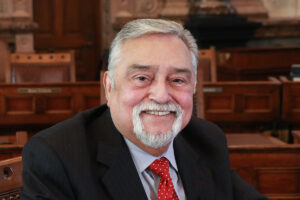
Interview of Paul Feleciano, February 11, 2022
Interviewed by Eric Sexton
Paul Feleciano served from 1972 until 2003 in the Kansas Legislature, primarily in the state Senate. During his 31 year tenure he has served on almost every committee. His interview discusses a wide range of issues including groundwater management, mental health reform, changes in the penal system, but his descriptions of the personalities of Senate leadership make that era come alive. He characterizes the men and women serving in the 1970's and 80's as giants --articulate, caring, compassionate problem solvers who would work "across the aisles" to make things happen. As the legislature moved into Show Morethe 21st Century, Feleciano notes the split in the Republican Party between conservatives and moderates became a real problem because the impact was, "they didn't want to compromise." After leaving the legislature, Feleciano was appointed to the Kansas Parole Board and served there for six years. Show Less
